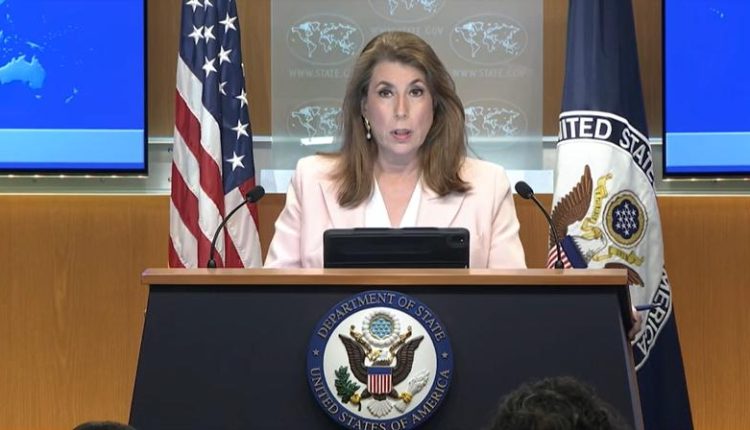U.S. Condemns Inflammatory Rhetoric Against Syria’s Druze Community, Urges Protection of Civilians
By Kardo Roj
WASHINGTON, U.S. (North Press) – The United States Department of State strongly condemned recent inflammatory rhetoric and acts of violence targeting Syria’s Druze community, calling it “unacceptable” and urging transitional authorities to act decisively in protecting civilians and ensuring accountability.
In a statement issued Friday, State Department spokesperson Tammy Bruce described the surge in sectarian discourse and related violence as a disturbing development. “The recent violence and incitement against members of the Druze community in Syria is deplorable and unacceptable,” she said, adding that the U.S. remains concerned about rising sectarian tensions in the country.
Her comments follow reports of violent clashes earlier this week in predominantly Druze-populated areas such as Jaramana and Ashrafiyat Sahnaya near Damascus. These confrontations, initially framed by official Syrian media as actions against “outlaws,” quickly escalated into broader violence, prompting concerns from international observers and minority rights groups.
Bruce emphasized the responsibility of Syria’s transitional leadership to de-escalate violence and prevent further civilian harm. “Transitional authorities must halt the fighting, hold perpetrators accountable, and guarantee the security of all Syrians,” she stated, stressing the importance of inclusive governance and rule of law during the country’s fragile political transition.
The statement also highlighted the broader dangers of sectarianism, warning that such divisions could plunge Syria and the region into deeper chaos. “Sectarianism will only drag Syria and the region into further disorder and violence,” Bruce cautioned, reiterating Washington’s support for a political solution grounded in dialogue and representation for all ethnic and religious groups.
The U.S. position reflects ongoing international advocacy for a pluralistic political framework in Syria, where all components of society—Arabs, Kurds, Druze, Assyrians, and others—are afforded equal protection and political inclusion. Bruce reaffirmed this vision by stating: “We have seen Syrians resolve their differences through peaceful means and negotiation.”
She also called for the establishment of a future Syrian government that genuinely represents the country’s diversity and safeguards its citizens. “A future government must represent and protect all Syrians and include all segments of Syrian society, including ethnic and religious minorities,” she said.
While the State Department did not directly reference any actors, analysts view the remarks as part of broader diplomatic pressure to contain sectarian spillover and prevent the marginalization of minority communities, particularly as transitional arrangements remain fluid and contested.
The U.S. statement comes amid a tense regional backdrop. Earlier this week, Israeli Defense Minister Yisrael Katz issued stern warnings to Damascus following reports of violence against Druze civilians, even ordering limited military strikes near Ashrafiyat Sahnaya. These actions have fueled concerns of a wider escalation along sectarian lines.
Within Syria, the Autonomous Administration of North and East Syria (AANES), which governs a multi-ethnic region in the country’s northeast, has repeatedly underscored the importance of intercommunal harmony and civilian protection as a pillar of governance. Although the Druze-majority areas lie outside the AANES’s direct control, the inclusive political model practiced in AANES-controlled territories is often cited by observers as a possible template for broader national reconciliation.
As Syria remains embroiled in a fragile transition and geopolitical fragmentation, international actors like the U.S. are increasingly vocal in calling for inclusive dialogue and protection of minority rights. Friday’s statement underscores the growing concern that unchecked sectarianism could derail efforts to achieve stability and rebuild trust among Syria’s diverse communities.
Whether these calls will influence internal dynamics remains uncertain. However, they add diplomatic weight to ongoing efforts aimed at steering Syria toward a future rooted in coexistence, civilian safety, and representative governance.

